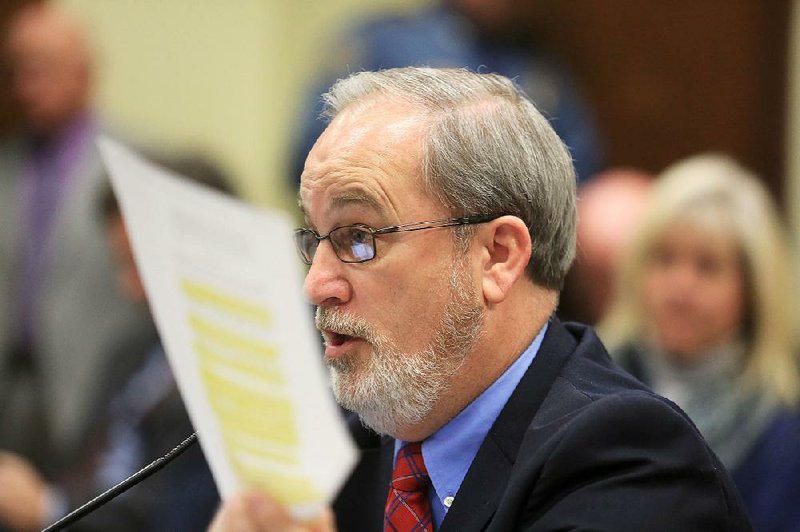A bill to establish a monument of the Ten Commandments on the state Capitol grounds cleared another hurdle with a favorable committee vote by lawmakers Friday.
Senate Bill 939, by Sen. Jason Rapert, R-Bigelow, cleared the Arkansas House State Agencies and Governmental Affairs Committee with an 11-3 vote despite a sizable number of citizens who came to testify against the legislation.
The bill, which passed in the Senate on Wednesday on a 27-3 vote, will go to the House floor for consideration next week.
The House co-sponsor, Rep. Kim Hammer, R-Benton, said the monument -- which would be purchased with private, not public funds -- should be seen as a way to honor the historic role the biblical text has had in U.S. and Arkansas history and not seen solely as religious.
He argued that similar displays are in other public areas across the country, including outside Texas' state Capitol building.
"This is patterned after what was done in a few other states. Some of those states, I'll put out this disclaimer, were challenged and not allowed to do it, but Oklahoma was a state that was allowed to do this," Hammer said. "It has withstood the scrutiny of not only state courts but also the federal court that upheld the language for that to happen."
A legal challenge to the Texas monument in the U.S. Supreme Court lost in 2005, mainly because the court ruled it had been there for so long that it was a historic artifact and had demonstrated it posed no harm. On the same day, the nation's top court ruled that similar monuments at two courthouses in Kentucky did violate the U.S. Constitution.
The law creating the monument in Oklahoma that Rapert modeled his legislation after was upheld by an Oklahoma circuit judge in 2009. Three years later, an atheist group sued the state in federal court for violating the establishment clause of the First Amendment and the due process and equal protection clauses of the 14th Amendment because the monument showed public support for one religion over others.
Earlier this month, the federal case was tossed after a judge ruled that the atheist group lacked standing to bring the suit forward.
Anne Orsi of Little Rock told the House committee that acceptance by the courts has been rare and that arguments made by supporters that the Ten Commandments serve a major role in the history of the U.S. legal system were overblown.
"The challenges to Ten Commandments [displays] that have happened around the country have uniformly lost when it's been a new monument," she said. "To say we're basing our laws on the Ten Commandments is simply not accurate. ... [They] didn't originate the 'don't kill' idea nor did they originate the 'don't steal' idea."
Jim Sewell, also of Little Rock, said the bill did not seek to display a historic legacy, but rather a Christian legacy instead of that of another faith.
"It goes against the separation of church and state. Period," he said. "You want to have a monument? That's fine. Not on the state grounds. It doesn't belong there."
Another critic pointed out that though no public money will be used to create and install the monument, once it is entrenched on state grounds, its protection and upkeep would be the responsibility of the secretary of state's office, which would mean public funding was being used for the monument.
Metro on 03/28/2015

